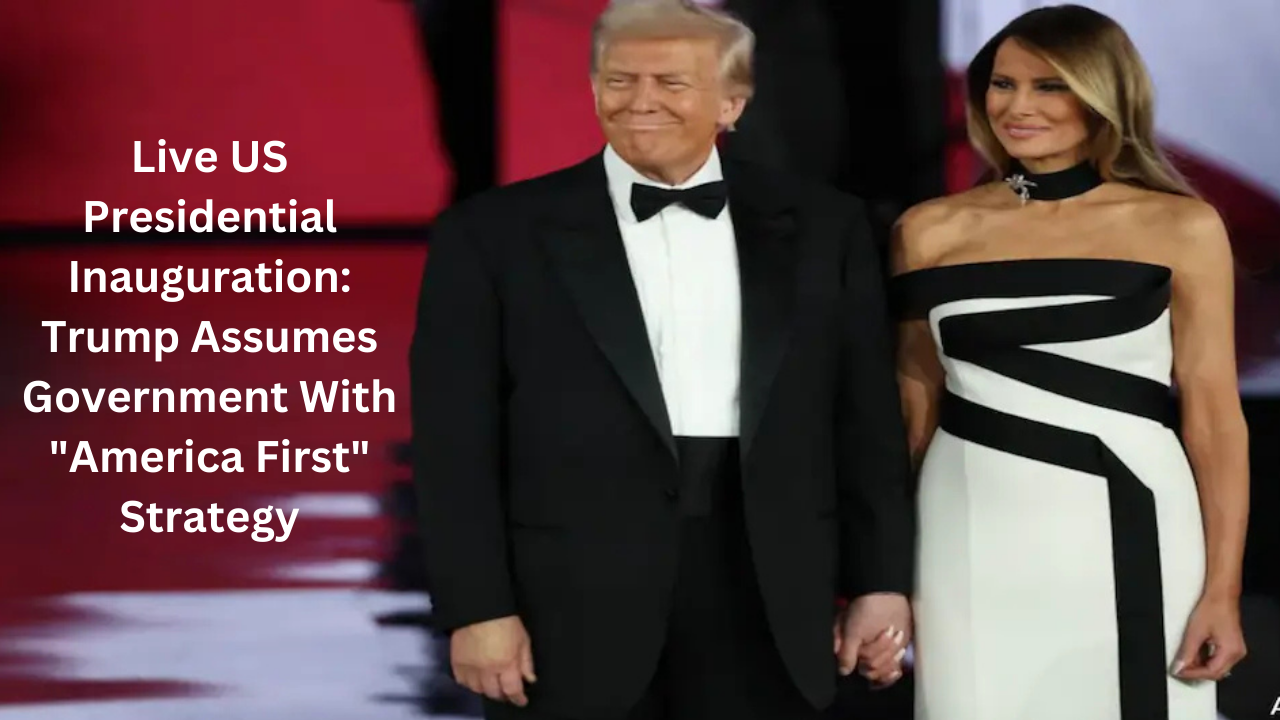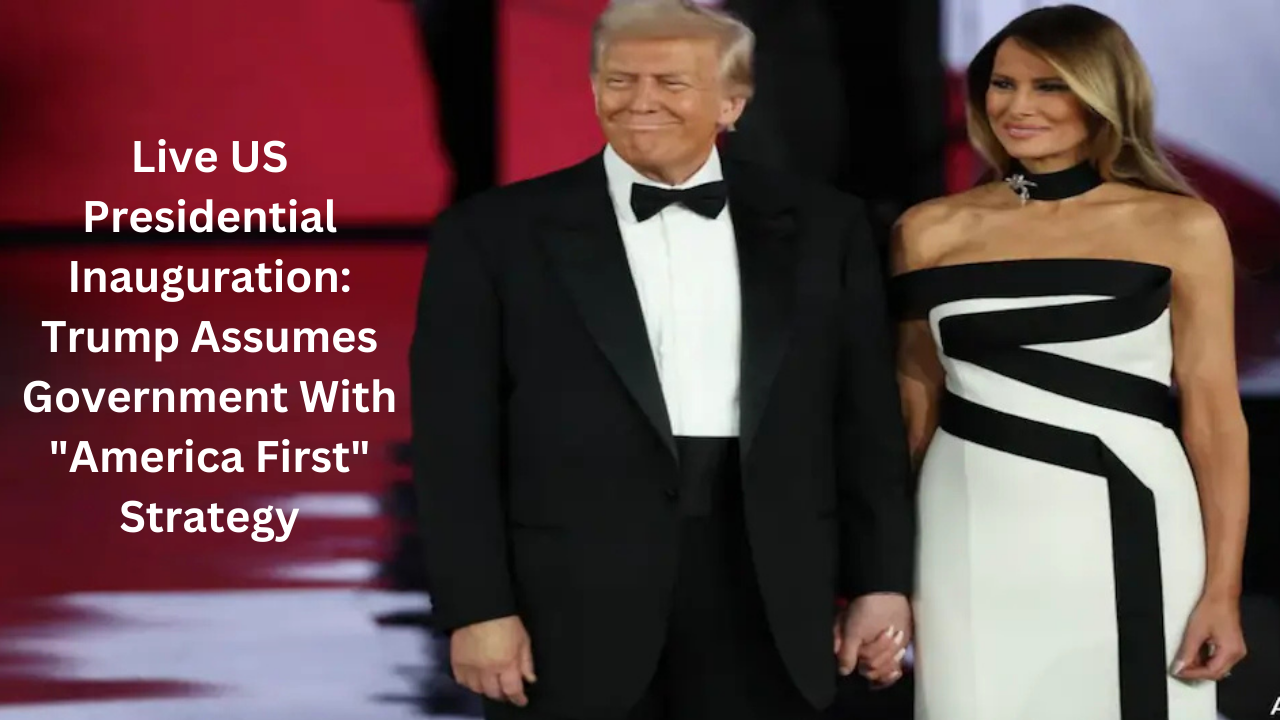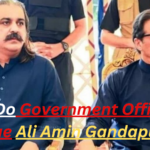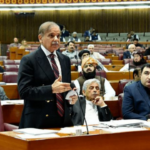<iframe src="https://bwidget.crictimes.org/" style="width:100%;min-height: 250px;" frameborder="0" scrolling="yes"></iframe>
Live US Presidential Inauguration: Trump Assumes Government With “America First” Strategy

In a historic and contentious inauguration that was televised to millions of people worldwide, Donald Trump took the oath of office as the 45th President of the United States on January 20, 2017. Trump gave a speech that established the tone for his presidency amid the pomp and circumstance of the ceremony in Washington, D.C., highlighting his “America First” stance, which would come to characterize many of his policies during his administration. Trump made audacious promises about reestablishing national grandeur and changing the global order when he assumed office from Barack Obama, promising to put the needs of the American people first.
A Disparaging Opening
It was one of the most controversial in American history. Although his victory over Hillary Clinton was historic, it left the nation sharply divided after a bitter and divisive fight in the 2016 election. Both passionate support and fierce resistance were generated by Trump’s ascent to power, which was propelled by his pledge to “drain the swamp” of Washington politics. Millions of Americans opposed his rise to power, leading to the Women’s March on January 21, 2017, which turned into one of the largest protests in American history.
On the other hand, the inauguration was a win for Trump’s followers. A sizeable section of the voters that felt left behind by conventional politicians responded favorably to his populist platform, which sought to bring about change in Washington. His “America First” slogan resonated because it promised a significant departure from the policies of his predecessors, especially Barack Obama.
“America First”
The centerpiece of Trump’s inaugural address was “America First,” a campaign slogan that has served as a defining characteristic. The statement emphasized his philosophy of both foreign and domestic policy, which holds that the United States should put its own economic and security interests first. In his speech, Trump explicitly denounced the globalist policies of the previous administration, especially with regard to trade, immigration, and international collaboration.
Trump’s opening statement set the tone for his presidency: “As Americans, we are now united in a massive national endeavor to rebuild our nation and restore its promise to. “We shall work together to shape America’s and the world’s future for many years to come. We will encounter difficulties. We’ll face challenges. However, we will do the task.
Obama’s message of hope and unity, which emphasized inclusivity and international cooperation, stood in stark contrast to this rhetoric. Trump had a very different idea. He pledged to prioritize American interests, advocating for stricter immigration laws to save American jobs and withdrawing the United States from international accords like the Paris Climate Agreement that he said threatened American sovereignty.
Trump’s emphasis on jobs was among the most notable aspects of his inauguration speech. In order to win the Electoral College, he presented the loss of manufacturing jobs as one of the main complaints of the American people, especially in the Rust Belt states. He pledged to safeguard American workers, restore jobs to the United States, and restructure trade agreements that he felt were detrimental to the nation.
Populism and Racism Take the Lead
Trump also supported American nationalism in his inauguration speech. Trump’s use of the “America First” slogan placed him in line with a larger worldwide trend of populist politicians who were opposing the accepted standards of internationalism and international collaboration. Voters who believed that the U.S. had been too ready to hand over authority and influence to other nations, particularly in sectors like trade and defense, found resonance in his strategy.
Trump’s populist rhetoric touched on social concerns and promised to restore law and order in addition to economic protectionism. He underlined the value of patriotism and promised to restore respect for American institutions, especially the military and law enforcement. He would also take a tough stance on matters like immigration, advocating for tighter border controls and a crackdown on illegal immigration.
Trump’s criticism of international institutions like the UN and NATO also mirrored the “America First” stance. He made it plain that the United States would no longer be responsible for paying for the defense of other countries, even though he did not explicitly reject these organizations. His “America First” worldview, which prioritized American interests over those of other countries, was reflected in this.
Economic Perspectives: Employment and Commerce
Trump’s inauguration speech focused heavily on his economic objectives. He attacked what he saw as unfair trade practices that had resulted in the loss of manufacturing employment in the United States. He also called attention to trade agreements such as the North American Free Trade Agreement (NAFTA), which he promised to renegotiate or possibly abolish in favor of agreements that would benefit the United States.
Trump announced that his administration would give priority to policies that promoted home manufacturing and job growth by stating, “We will follow two simple rules: buy American and hire American.” In order to please his working-class constituency, which had backed him in significant numbers, especially in industrial areas where conventional manufacturing industries had declined, he placed a strong emphasis on these issues.
Trump attacked the Washington establishment for what he described as a lengthy history of corruption and inefficiency. He portrayed himself as an outsider who was committed to enacting reform and giving the American people back their economic dominance. His fans, who were angry at the alleged shortcomings of the political establishment, were greatly inspired by this outsider story.
Immigration and National Security
Trump’s inauguration speech also focused heavily on national security, especially as it related to immigration. One of the main tenets of Trump’s campaign was his harsh immigration views, which persisted during his inauguration speech. He claimed that illegal immigration threatened American employment and safety; therefore, he vowed to protect the country’s borders and fight it.
Trump claimed that “protecting our borders will lead to great prosperity and strength,” presenting his immigration policy as a component of a larger initiative to safeguard the future of the United States. In a pledge that would come to define his presidency, he made it apparent that his government would take decisive action to stop the flow of illegal immigrants, including erecting a wall along the US southern border.
Trump’s mistrust of multilateral alliances also influenced his national security beliefs. He underlined that the United States will no longer be the world’s policeman, even as he reiterated America’s dedication to defending its citizens. This isolationist discourse was in sharp contrast to other administrations that had placed a high priority on preserving a position of global leadership.
Worldwide Reaction
Both domestically and internationally, Trump’s inauguration speech elicited conflicting responses. Many detractors voiced their concerns about his protectionist policies and nationalistic speech, while his fans applauded his audacious vision for America’s future. The impact of Trump’s presidency on international ties has also caused uncertainty among world leaders.
Trump’s “America First” stance could drastically alter U.S. foreign policy in the years that follow. Trump’s presidency would be a significant shift from the international strategy of past administrations, as he would withdraw from the Paris Climate Agreement and launch trade conflicts with China.
In conclusion
A pivotal event in American political history, Donald Trump’s inaugural speech set the tone for an administration that would defy established conventions and reshape American foreign policy. His “America First” policy, which prioritized nationalism, economic protectionism, and a strict immigration policy, would influence the course of the nation for many years to come.
Trump’s vision of American grandeur struck a chord with millions of Americans who felt left out by the political elite, despite the turmoil and opposition that characterized his presidency. The consequences of Trump’s “America First” program would be felt both domestically and internationally as the United States enters a new era under his leadership.





